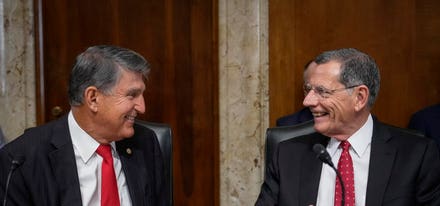Long-Awaited Permitting Reform Bill Is Unveiled, But Agreement Remains Elusive

- Share to Facebook
- Share to Twitter
- Share to Linkedin
What’s inside? Senators Joe Manchin (I-WV) and John Barrasso (R-WY) unveiled their version of … [+]
Getty Images
After months of anticipation, Senators Joe Manchin (I-WV) and John Barrasso (R-WY) finally unveiled their bipartisan Energy Permitting Reform Act of 2024. The legislation aims to streamline the approval process for energy projects, from renewable sources to fossil fuels. In some ways, the bill represents a significant step forward in the longstanding drama surrounding America’s dysfunctional permitting system. However, significant challenges stand in the way of this bill making it through Congress.
The proposed reforms touch on numerous aspects of energy infrastructure development. For renewable energy advocates, the bill offers expedited environmental reviews for low-impact projects and sets ambitious targets for renewable energy production on federal lands. Fossil fuel proponents will appreciate provisions mandating regular offshore and onshore oil and gas lease sales and limits on the timeframe allowed for legal challenges to energy projects.
One of the more notable aspects of the legislation is its approach to electric transmission infrastructure. The bill would require transmission planning regions to engage in joint interregional planning, potentially accelerating the development of long-distance power lines necessary for integrating renewable energy onto the grid. It also aims to enhance the federal government’s authority in siting interstate transmission projects, a move that could ruffle feathers of states’ rights advocates.
Despite its bipartisan origins, the Energy Permitting Reform Act faces an uphill battle in Congress. Some Democrats and environmental groups are balking at provisions they see as too friendly to fossil fuel interests. The 150-day statute of limitations for legal challenges could constrain a powerful tool activists use to block or delay projects they see as harmful to the environment. Similarly, the mandate for annual oil and gas lease sales through 2029 runs counter to many Democrats’ climate goals.
Democrats are also likely to be skeptical of the LNG export provisions. By setting a 90-day deadline for the Secretary of Energy to approve or deny export applications, the bill attempts to prevent future administrations from implementing pauses similar to the one recently lifted by a court order.
WWE SmackDown Results: Winners And Grades On July 26, 2024
Today’s NYT Mini Crossword Clues And Answers For Saturday, July 27
Noche UFC 306 Card Announced With 2 World-Title Fights
On the Republican side, the transmission reforms are likely to prove a sticking point. By forcing western states to serve as energy corridors for coastal population centers, the enhanced federal role in transmission siting and planning is likely to be viewed as overreach.
Additional concerns about transmission line provisions relate to grid reliability and questions about the wisdom of adding more intermittent power sources to an increasingly strained electricity grid. The legislation attempts to address some of these concerns about grid reliability, but may not go far enough in the minds of many Republicans.
function loadConnatixScript(document) {
if (!window.cnxel) {
window.cnxel = {};
window.cnxel.cmd = [];
var iframe = document.createElement(‘iframe’);
iframe.style.display = ‘none’;
iframe.onload = function() {
var iframeDoc = iframe.contentWindow.document;
var script = iframeDoc.createElement(‘script’);
script.src = ‘//cd.elements.video/player.js’ + ‘?cid=’ + ’62cec241-7d09-4462-afc2-f72f8d8ef40a’;
script.setAttribute(‘defer’, ‘1’);
script.setAttribute(‘type’, ‘text/javascript’);
iframeDoc.body.appendChild(script);
};
document.head.appendChild(iframe);
const preloadResourcesEndpoint = ‘https://cds.elements.video/a/preload-resources-ovp.json’;
fetch(preloadResourcesEndpoint, { priority: ‘low’ })
.then(response => {
if (!response.ok) {
throw new Error(‘Network response was not ok’, preloadResourcesEndpoint);
}
return response.json();
})
.then(data => {
const cssUrl = data.css;
const cssUrlLink = document.createElement(‘link’);
cssUrlLink.rel = ‘stylesheet’;
cssUrlLink.href = cssUrl;
cssUrlLink.as = ‘style’;
cssUrlLink.media = ‘print’;
cssUrlLink.onload = function() {
this.media = ‘all’;
};
document.head.appendChild(cssUrlLink);
const hls = data.hls;
const hlsScript = document.createElement(‘script’);
hlsScript.src = hls;
hlsScript.setAttribute(‘defer’, ‘1’);
hlsScript.setAttribute(‘type’, ‘text/javascript’);
document.head.appendChild(hlsScript);
}).catch(error => {
console.error(‘There was a problem with the fetch operation:’, error);
});
}
}
loadConnatixScript(document);
With Manchin retiring at the end of this Congress, the bill represents his last major push for permitting reform. However, in an election year, neither party may be eager to hand the other a significant legislative victory. Senate Majority Leader Chuck Schumer’s previous comments about the virtual impossibility of passing permitting reform this year underscore the political headwinds facing the legislation.
That said, the mere existence of this bill represents progress. The current system, with its lengthy reviews and frequent legal challenges, has become a bottleneck for energy infrastructure development of all kinds. For years, policymakers refused to consider attempts to change course. Finally, efforts to modernize America’s broken permitting process are receiving the attention they deserve.
However, the compromises needed to achieve passage may ultimately be what dooms this legislation. Some environmental groups are already decrying the bill as a giveaway to fossil fuel companies, while conservative groups worry the bill hands too much power to federal regulators and hurts consumers. The Energy Permitting Reform Act attempts to thread the needle between all these competing interests.
After months of waiting, all sides now have a clear sense of what Manchin and Barrasso’s idea of “bipartisan permitting reform” looks like. The inclusion of provisions appealing to both parties suggests there’s potential for compromise, but the polarized political environment and looming elections seriously complicate any path to passage.



